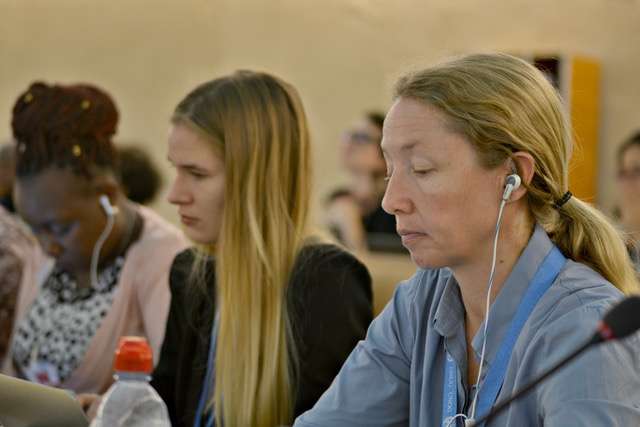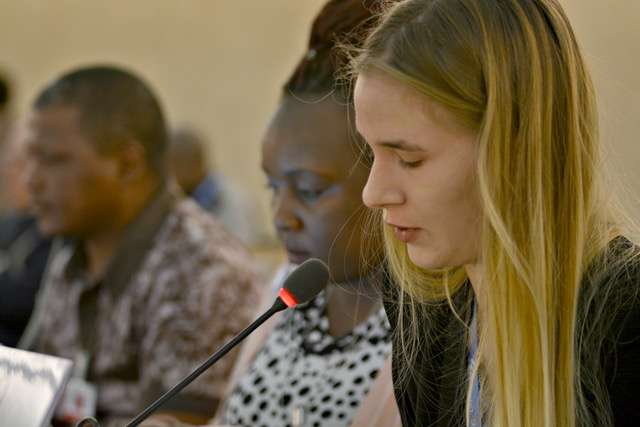When it comes to making corporations take responsibility for the human rights impacts of their global operations, voluntary measures are insufficient. That’s why countries met from October 23-27 to negotiate an international, legally binding instrument on Transnational Corporations (TNCs) and other Business Enterprises with respect to human rights.
Representatives from more than 100 states and 200 social movements, trade unions, and civil society organizations (CSO) participated in the TNC treaty negotiations, which took place at the United Nations in Geneva, through a working group established by the Human Rights Council. CIEL participated in the negotiations by making several oral interventions concerning specific chapters of the draft treaty, by organizing and sponsoring several side events, and by submitting a written contribution on the draft. The TNC treaty process demonstrated yet again the crucial role of civil society in high-level decision-making. The numerous oral interventions made by CSO representatives, their direct advocacy with states, and their constant presence and influence throughout the process had a visible effect engaging states that were otherwise reluctant to support the process.

Although the number of states participating in the negotiations set a record for Human Rights Council working groups, many states did not engage substantively in the discussions. For example, the majority of EU member states made only modest contributions to discussions, instead deferring to the EU to speak on their behalf. France, however, spoke in favor of its new law, which imposes the duty of due diligence on companies, and it called on other states to push for similar regulations.
At the first opportunity, the European Union threatened to derail the entire meeting by objecting to the Programme of Work, which caused tension, irritation, and opposition among other states. Fortunately, the EU backed down from this position, but it continued to take an obstructive, albeit engaged, approach for the remainder of the week.
The representatives of the Russian Federation and Singapore also took unsupportive positions towards elements of the draft treaty. On the other hand, the representatives of Ecuador and Bolivia were vocally supporting of much of the draft treaty’s elements.
Among the states that engaged in the discussions, many raised questions about the draft without making proposals to clarify their position on various elements of the draft treaty. This hindered the progress of the discussions.
What will the TNC treaty look like?
There is still a long way to go on creating a binding treaty, but the negotiations raised important questions for states:
Do human rights obligations take precedence over trade and investment agreements?
Discussions began by focusing primarily on two issues, namely ‘extraterritoriality’ (the duty of a state to prevent human rights violations outside their territories) and the “supremacy of human rights over trade and investment agreements.” Some states argued that no hierarchy can exist between international legal regimes, and therefore, it is wrong for the treaty to state that human rights take precedence over the enforcement of economic agreements. Meanwhile, businesses pointed out that such a principle would be a disincentive to foreign investment. CIEL’s position is that there can be no question that respect for human rights is foundational for any profitable enterprises, and establishing the primacy of people over profits in the treaty would be beneficial.

Photo courtesy of Alex del Rey, Treaty Alliance
Which companies will the treaty cover? Should the treaty apply only to transnational corporations or to all business enterprises?
Everyone agreed that people should be protected from all possible harm, no matter what type of enterprise is involved. However, some argued that domestic enterprises are already included in national regulations, and that the value of this treaty is to address a gap in access to justice that results mainly from the activities of transnational corporations, which often use complex corporate structures to avoid cross-border liability. While CIEL agrees that human rights obligations extend to all states and all corporations, this treaty can be most useful if it is targeted at gaps in international law and therefore focused on transnational activities.
How will companies be held liable for harms?
A strong coalition, including women, indigenous peoples, and local community representatives from around the world, insist that establishing corporate liability is essential to solve the current accountability gap. The coalition welcomed the draft treaty’s emphasis that states must establish corporate liability under administrative, civil, and criminal law. A representative of the International Commission of Jurists emphasized that corporations, including the legal entity and its agents, should face criminal liability when they commit the most serious of human rights violations, which may be equivalent to international crimes such as genocide, crimes against humanity, torture, or war crimes. Yet the issue of corporate criminal liability proved to be a contentious topic. Others argued that some legal systems do not allow for the imposition of criminal liability on legal entities; thus, provisions requiring such liability would be inappropriate.
How will the treaty ensure access to justice for communities?
Communities seeking justice against big multinationals face many legal, jurisdictional, and practical obstacles — such as the practical impossibility of obtaining documentation and information about companies; the often prohibitive financial costs involved in bringing a case; the forum non conveniens doctrine, under which courts may refuse to take jurisdiction over an issue if another court would be better suited to hear the case; and the corporate veil, which protects company shareholders from being held personally liable for the actions of a company. In the negotiations, the issue of jurisdiction was identified as a crucial topic for guaranteeing access to justice. Many emphasized that jurisdictional barriers can lead to a denial of justice, since it can be extremely difficult to hold companies accountable in the country where they operate and in the country where their headquarters are based. Unfortunately, countries did not reach a consensus on either of these challenges.

Photo courtesy of Alex del Rey, Treaty Alliance
How will the treaty be implemented?
One important question that arose around the implementation of the TNC treaty was whether an international court or tribunal should be established to hear cases against transnational corporations. Hypocrisy was rife with some delegates claiming that it would be too difficult to create a court to enforce corporate obligations regarding human rights while their governments are simultaneously pushing to create a court to enforce the investment rights of corporations (the proposed Multilateral Investment Court).
What is the path forward for negotiations?
Towards the end of the negotiations, the EU tried yet again to derail the process by objecting to a continuing round of negotiations in 2018. But civil society and many states insisted that a fourth session must take place in 2018. The path forward will be determined in the coming months.
Although the timeline for future negotiations is unclear, the power of civil society demonstrated that even countries that are home to some of the biggest corporations in the world can be engaged in this process, bolstering the case that people are more important than profits.
The draft report of the third session, which summarizes what was said during the negotiations, can be read here.
By Carmen Steg, Geneva-based intern
Originally posted November 9, 2017
Photo credit: Alex del Rey/Treaty Alliance
